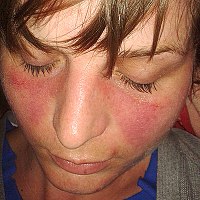
Photo from wikipedia
The Janus kinase (Jak)/signal transducer and activating protein (STAT) pathways mediate the intracellular signaling of cytokines in a wide spectrum of cellular processes. They participate in physiologic and inflammatory cascades… Click to show full abstract
The Janus kinase (Jak)/signal transducer and activating protein (STAT) pathways mediate the intracellular signaling of cytokines in a wide spectrum of cellular processes. They participate in physiologic and inflammatory cascades and have become a major focus of research, yielding novel therapies for immune-mediated inflammatory diseases (IMID). Genetic linkage has related dysfunction of Tyrosine kinase 2 (Tyk2)—the first member of the Jak family that was described—to protection from psoriasis. Furthermore, Tyk2 dysfunction has been related to IMID prevention, without increasing the risk of serious infections; thus, Tyk2 inhibition has been established as a promising therapeutic target, with multiple Tyk2 inhibitors under development. Most of them are orthosteric inhibitors, impeding adenosine triphosphate (ATP) binding to the JH1 catalytic domain—which is highly conserved across tyrosine kinases—and are not completely selective. Deucravacitinib is an allosteric inhibitor that binds to the pseudokinase JH2 (regulatory) domain of Tyk2; this unique mechanism determines greater selectivity and a reduced risk of adverse events. In September 2022, deucravacitinib became the first Tyk2 inhibitor approved for the treatment of moderate-to-severe psoriasis. A bright future can be expected for Tyk2 inhibitors, with newer drugs and more indications to come.
Journal Title: International Journal of Molecular Sciences
Year Published: 2023
Link to full text (if available)
Share on Social Media: Sign Up to like & get
recommendations!